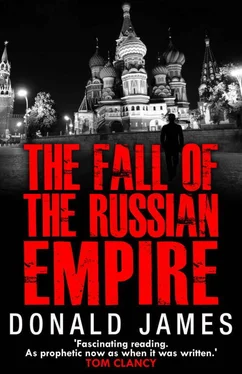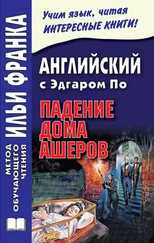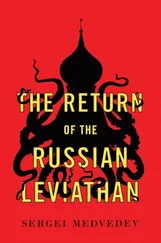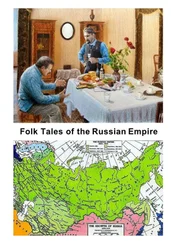The only exception was the Kremlin. Operated by their own generators, searchlights, pointing down from the crenellated wall, isolated bright pools of light in the darkness of Red Square. Above the ancient towers of the Kremlin, spotlights hit great rectangles of red cloth writhing slowly in the freezing wind. Perhaps most bizarre of all was the brightly lit multicolored onion domes of St. Basil’s against the pitch-black background of the city.
From apartment blocks on the eastern side of the capital a steady trickle of people left to cross to relatives in what were believed to be the safer, southern suburbs. As ever in the land of the Soviets, it was information above all else which was lacking. Rumors of the anarchy in towns north of Moscow had circulated for some days, but while those few Penal Brigades reaching the city rail stations had been more or less contained by the militia, there bad been no panic. Then the news began to filter through of a vast ragged army marching through Balashiki and of the failure of the militia to turn them back. And for the first time, too, Muscovites heard the term the Gulag Regiments.
During the night all foreign airlines canceled or diverted their flights to and from Moscow’s Sheremetyevo Airport. Long before morning Aeroflot operations had ceased too. While broadcasting continued no mention was made of the crisis and all news items were replaced with programs of patriotic music.
In thousands of apartment blocks throughout the city people speculated on whether or not the vlasti had already fled to safety. Some claimed to have seen limousines racing south or west down the privileged center lanes throughout the afternoon. Others said that militia units had been withdrawn from the menaced eastern suburbs to protect just those vlasti who were supposed by others to have left. Of certainty there was very little, and more than anything the darkness overhanging the city added to their fears.
Before first light people living in the area of workers’ flats around the Kursk Station began to hear scattered rifle-fire and the thud of heavier armament. Coming out onto the balconies they could see, far across the city ring road, points of leaping light as fires started in the Reutov District.
Every apartment now had an appointed watcher at the window whose task it was to report on the advance of the Gulag Regiments. By three or four in the morning the early confidence that the armed militia would turn them back had dissipated. The approaching rifle-fire and buildings burning ever closer were evidence enough of a steady advance by the Gulags. Now the first families of refugees, those without relatives in other parts of the city, began to leave their homes and trudge through the snow-covered streets toward the city center. Soon, from the area of the Aviamotor Metro Station the Shosse Entusiastov was thick with people carrying suitcases and children wrapped in blankets. And for these refugees already moving toward the center of the city, the clatter of militia helicopters and the beams of their headlights shining down from among the dark tower blocks added a new dimension of eeriness to their fears.
At first light it was evident that the city was in chaos. Thousands of refugees tramped westward along Kirov Street past the Lubyanka in Dzerzhinsky Square and on down Marx Prospekt. Thousands more exhausted people huddled for protection in Red Square, along the Kremlin Wall and around the GUM department store. Some lay in the snow, wrapped in sleeping bags or blankets. Others produced small stoves or even lit wood fires to boil kettles for their tea. Like some huge marketplace, which once it had in fact been, Red Square steadily filled with people.
Then the first two shells exploded among them. In indescribable panic the vast crowd scrambled across the snow. The point of impact of each shell was marked by mangled bodies hurled in a bloody ray-like pattern across the trampled snow.
The next two shells struck the GUM department store showering glass over the fleeing crowd. As four more shells were fired in quick succession, women screamed wildly, men cried for help and children lost their parents and scattered for the safety of the side streets.
The Georgian historian, C.G. Kodadze, described that first morning from the point of view of the Gulag Regiments.
* * *
In my regiment, and I imagine in most others, too, we had experienced several distinct changes in mood since setting off from the camp at Pavlovsky. To this day I believe that the original intentions of the men were simply to return home. There was this fierce underlying suspicion of the authorities’ intentions, and there is no doubt that the regiments were prepared to fight rather than return to Siberia.
But until that first attack upon us by the militia unit at Balashiki I don’t believe any of the regiments, except perhaps the Latvians and Estonians, whose bitterness exceeded all others, in any way intended what followed.
During that first night, from Balashiki to the Moscow Ring Road, we were attacked incessantly by militia units using gas and even mortars. And all the rage and desperation of the last years of camp life exploded within us. The Baltic Regiments, as so often, acted first. It was they who set up the first battery of German 88 guns in Ismaylovsky Park and began to shell the city. After that battery was attacked and destroyed by Soviet fighter planes, the Balts located the other guns among apartment blocks and warehouses, where it was impossible to strike at them from the air. In their furious determination to inflict as much damage on the Russian capital as possible the Baltic gunners fired throughout the next morning and early afternoon until the last shell was spent.
But by then the armament of the other Gulag Regiments had received the addition of captured militia mortars and gun-carrying personnel vehicles, and in every street in the Reutov District where my unit, the 5th (Georgian) Gulag Regiment was fighting, you could see a mortar team shelling the militia units to our front.
Probably very few among us stopped to ask ourselves why regular Soviet Army units were not being used by the authorities, but at that time we had no knowledge of the Armed Forces’ reinforcement problems nor indeed of the widespread rebellion against the mobilization order in our hometowns. We did know, however, that a unit of an Azerbaijanian National Division had been marched up from south Moscow but had refused to join the battle when it saw that it was expected to fight other Azerbaijanians.
We had no commander, or command organization. But there is no doubt that the ferocious hatred of the Balts spearheaded the attack on the capital, and in that sense most of the Gulag Regiments were indeed following a single objective…
And now a new element began to enter the situation. In the eastern suburbs through which the Gulag Regiments had already passed, those people who had remained in their homes began to emerge. At Balashiki, which had seen the first clash, the streets were littered with smoking hulks of vehicles, shop windows were shattered, warehouses burning. Most important of all, there was no visible authority, no militia. At first the people of the district drifted through the streets. Some, furtively, began to rob the bodies of militiamen shot down in the alleys. Then bolder spirits entered wrecked Party offices and began carrying out television sets and the contents of well-stocked canteen refrigerators. The Balashiki Party special store, unknown all these years to the people in the district, was discovered and looted before being burned. It was here in Balashiki that the first Party members were hanged.
Kuntsevo, in the so far unaffected west of the city, the scene of the disturbances on the day of President Romanovsky’s funeral, woke that morning to find that the local militia had been drafted into the clashes in the east suburbs. Within hours the old pattern reasserted itself. Street fires were built and food and vodka brought out. Pianos were carried into the cold morning air and dancing began beneath the squalid stilted blocks of flats. Arguments and fights became frequent as the vodka flowed. By midmorning the first Party offices had been ransacked. By the afternoon the militia headquarters was on fire and fuel tanks were exploding in the blazing bus station.
Читать дальше












